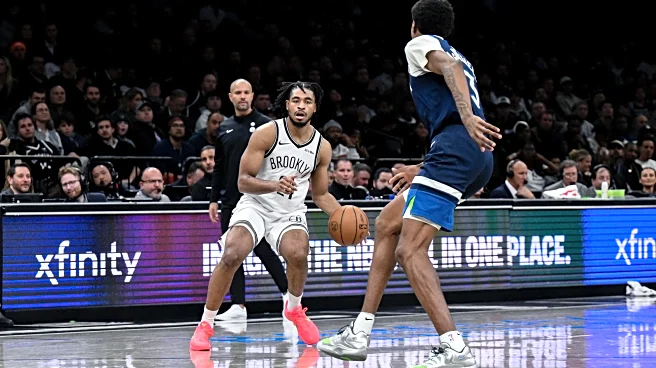College basketball tipped off this week, and it couldn’t have come any sooner for Brooklyn Nets fans. That has nothing to do with their appreciation for Gus Johnson’s voice nor the nostalgic “back to school”
vibes which the collegiate game brings. It has everything to do who they are, where they’re at, and where they seem to be heading.
Let’s start with the “who.” Brooklyn is a rebuilding team right now. Make NO mistake about it. The Nets carry the league’s youngest roster and made history in June when they drafted five five first rounders. In Brooklyn, it’s all about the future … which begins now.
They’re “at,” or I guess, “in” the Eastern Conference’s basement, sitting with an 0-7 record after dropping one to the Minnesota Timberwolves last night. The losses haven’t been pretty either. The Nets have the second worst point differential in the NBA right now. They are not a good team and don’t look like they’ll be one any time soon.
Okay, that’s where Brooklyn at. Now, where Brooklyn may be headed, which feels most concerning. The Nets own their first overall pick this year, but after that, they surrender swap rights to the Houston Rockets in 2027 but they still have the Knicks pick. Moreover, the 2027 Draft is seen as mediocre at best. So, to put it simply, they’ll want (and need) to strike while the NCAA iron is hot this summer if they want to return to relevance by the end of the decade.
Let me be clear, there’s only so much you can make of a team’s first seven games, and using them to gauge your multi-year outlook is as dangerous as it gets when it comes to the freezing cold take risk. But still, if we discounted everything because it’s “still too early,” what would even be the point of watching? Or better, what’s the fun in all that?!?
So, with that subtext acknowledged, let’s have some fun. Here are two major takeaways from Brooklyn’s first seven games of the 2025-26 campaign.
The rotation is flawed…even if you’re being generous
The Brooklyn Nets sure as hell have the record of a rebuilding team, but not the rotation of one, at least when it comes to minute distribution relative to league age.
Their minute-per-game leaders this year are in order, Michael Porter Jr., Cam Thomas, Nic Claxton, Terance Mann, Noah Clowney, and Tyrese Martin. You have to go seven spots down the totem pull to find a rookie, that being Egor Dëmin, who’s sharing a spot with Ziaire Williams. They both average 19.8 minutes per contest.
It shouldn’t be hard for anyone to figure out why this matters. Since before the season started, we knew the Nets would struggle to find wins this year, but we also knew they’d have an opportunity to make progress toward more in the future by developing their army of young players. That said, many of them remain in the barracks.
Going into the Minnesota game, the Nets were tied for fifth in total rookie minutes this season. While that’s still a high number, when you compare it to the size of Brooklyn’s rookie class, it loses its luster. The Nets don’t just have a leg up in terms of having to give minutes to; they have multiples! — at least two time more than all but one team, and a total number of first rounders that no NBA franchise has ever had.
I’ll admit, there’s some logic behind playing your veterans in the first half of the season to build up their trade value. The teams’ pursuit of picks can and should continue this season. You can’t trade Nic Claxton, Terance Mann, or Haywood Highsmith till December 15 by the rules and by February 5 by tradition, so this is your only time to dust them off and push them to the front of your display window.
But even if that’s the case, Brooklyn’s young players still need every minute they can get right now, unless the team wants to willingly hand the Houston Rockets a top-five pick after next season and push the return-to- relevance back another year. (It should be noted that beyond the five rookies, Ziaire Williams is still on his rookie deal and is 70 days younger than Wolf.)
They have too many players with a long way to go, and they need to start moving. Nolan Traoré needs to dribble through a defense about a thousand more times. Ben Saraf needs to shoot about a thousand more jumpers. Egor Dëmin needs about a thousand more reps penetrating the point of attack. Danny Wolf and Drake Powell have barely played to begin with, their ankles abandoning them so far.
It’s not about being good by this time next year; it’s about being halfway to decent.
Perhaps this all gets solved as Long Island gets its season underway this week and there’s more minutes to be had between the two teams. For now, though, the rotation feels out of sync with the team’s needs.
Yes, the defense is that bad
The Nets stand alone in defensive rating to begin the season, and not in the way you’d want them to. Brooklyn currently ranks dead last in the metric. The New Orleans Pelicans are pattering around behind them, giving up 126 points per 100 possessions to Brooklyn’s 130.6, but every team after that is separated by double digits.
If you’re looking to charge someone or something with this crime against the game’s backbone, there’s plenty of culprits to choose from, but you should probably start with Brooklyn’s transition defense.
There, Brooklyn’s rap sheet runs off the page. They gave up 17 break points to Minnesota, 18 to Philly, 18 to Atlanta, 21 to Houston, 25 to San Antonio, and 23 to Charlotte. That’s roughly a quarter’s worth of points in dunks, layups, or open threes in six of their first seven games. It’s helped their opponents surpass 130 points three times already this season in regulation. Last year, it took until March 28th for the Nets to have their third game of that sort. They only did four times the entire season.
Much of this boils down to lackadaisical or mistimed efforts from Brooklyn. The team either gets caught sleeping on cross court passes or takes bad angles filling lanes. The Nets also habitually over-help against the wrong personnel and can’t seem to chase down the ball either as it moves around the perimeter. Those last two issues have mainly persisted in the halfcourt, but make cameos in transition too.
The Nets don’t seem to value their defensive stops either, or at least don’t have the personnel to. Brooklyn has consistently given up extra possessions after forcing misses this season as well, ranking third last in opponent offensive rebound percentage, giving the ball back to their opponent for extra shots more than every third miss.
As for personnel, everyone in HSS Training Center knows who the big culprits are. As one insider told ND, the problem is that the two best offensive players — Cam Thomas and Michael Porter Jr. — are also the worst defensive. That’s a problem.
There’s a point in the first act of Moneyball where you hear a voice over the radio say the following about the 2002 Oakland A’s: “It’s everything. If there’s one thing you’d pick out, you’d try to fix it, but just everything is in a funk right now.”
That analysis is almost as lazy as that film’s efforts were in actually explaining why that team won 20 games in a row, but it plays through my head anytime I watch Brooklyn gear up to defend, and it’s an inescapable conclusion that they’re not playing on that side of the ball at a professional level.










